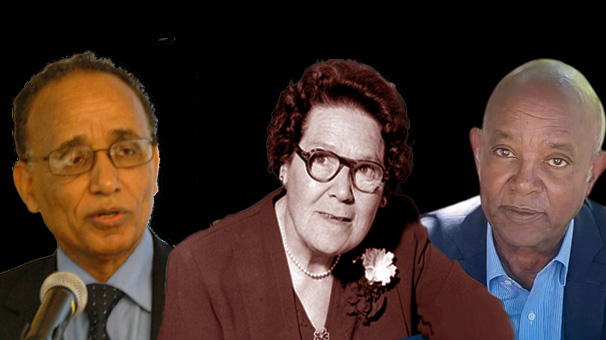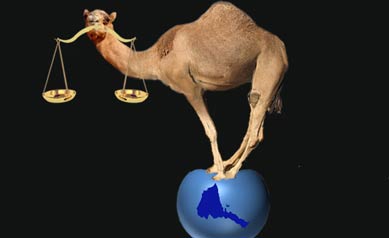Alemseged Tesfai: Is that all what you are?

Debunking Ethiopia’s memos of late 1940s claiming ‘the return of Eritrea to its motherland,’ Margery Perham, a British historian, wrote in 1948 that every sentence in those memos “cried for comment and correction.” That expression came to my mind this week while reading Almseged Tesfai’s five-page Epilogue for the translation of his worthy three volumes on our history. To say the least, I was stunned to find almost every sentence in the Epilogue crying for comment and correction. How come this is the same Alemseged in my head now coming with a partisan, PFDJ editorial-sounding piece of writing? Hmmm.
Frankly, I used to expect Alemseged to be somewhat different from the PFDJ clan still regurgitating all the filth of our past. I must also confess that I used to wish him all the best, as I unsuccessfully wished before prolonged lives for Yemane Baria and Tesfaye Ghebreab with the expectation that they probably would extend a helping hand in our unending struggle for a better Eritrea. Judging from his past writings, I somewhat hoped this Alemseged, this prolific author, this one of the best educated of our elite, may not fully share the mindset of the exclusive and destructive clique in Asmara that emptied the nation and pushed it to the dangerous precipice from where it now dangles without knowing its immediate future.
If it were not for copyright restrictions, it would have been easier for one to paste the entire 5-page Epilogue for readers to see and judge for themselves what our so far best historian, Alemseged, has finally come out with. Naïve readers like myself expected a balanced judgment of our tumultuous past six decades by someone of those took part in the struggle. On my part, I am losing hope that participants in the struggle may never be expected to drop down that poisonous partisanship even while writing the history of our contentious past since 1961. Thank you Alemseged for the useful volumes on the post-Italy two decades of our history, but you are making one pray for someone else from our own Eritrea, but who did not take part in the ELF-EPLF tag-of-war, to relieve you on the rest of the task for the decades after 1962. I hope I am wrong but as of now you don’t look to me to be right person to engage on that work. Here are some of my quick notes on that Epilogue.
- Alemseged starts his Epilogue by telling readers that our old organizations’ rhetoric and legacy still “dictate” our present “life and thinking.” Sadly, that is very true. Yet, instead of continuing to tell us what both the old ELF and the old EPLF had done to frustrate our great expectations in post-liberation Eritrea, he chose to limit himself repeating PFDJ’s tired language against only one of those old actors. Reading this Epilogue may embarrass many admirers of the writer, except that it is also red meat for those who chose to continue hanging around EPLF’s abnormality in Asmara, Higdef.
- Brother Alemsged also wrote in his opening sentences that “addition to the confusion will not benefit the quest for a definitive history of our past.” True! Nevertheless, the author soon jumps to accusing the old ELF of having continued the toxic atmosphere of violence and intolerance of the Unionist Party of the 1940s. What? … Examples cited are ELF’s action against Haraka, and the decision of its congress of 1972 (sic) to exclude other forces and voices and its posing as Haraka’s “negation, its antithesis.” But Alemseged had little to say about the EPLF – the ‘democratic’ alternative – aside from congratulating it for major successes that he described as its timely “acknowledgment and correction of mistakes and excesses.” Haye… bele Isaias.
- The writer rightly worried about the passage of many of our veterans without telling us their part of the truth. However, no paragraph in the Epilogue gives a slight hint that the historian had some awareness about what Ibrahim Mohammed Ali, Ahmed Nasser, Ibrahim Totil, Abdalla Idris etc have written about the issues the Epilogue grossly mentions in passing. Even living veterans still accessible to Alemseged would have told him that majority of Haraka members were not “left in the cold.” In fact a big number of them, except Said Nawd and a few, joined the armed struggle before the unhappy incident at Ela-Tsada. As the historian knows it well, the time seemed ripe for armed struggle and that unorganized groups were popping up with arms here and there before Hamid Idris Awate and his ELF – including people in faraway Addis Ababa from where first recruits of Haraka were sending arms, disobeying their own Haraka that did not step up on time to respond to their wishes. ELF’s declaration of armed struggle could to some extent be taken as a “rush to arms” although the winds for armed struggle pushing politicized young nationalists for action were difficult to ignore and control.
- Yes, brother Alemseged, Haraka had a roadmap which, as you said, was a coup d’état. But the oft repeated allegations and historian Alemseged’s affirmation that “the ELF had no defined strategy, philosophy or definite programme” do not fully qualify to be a fair treatment of history within that time framework and capacities of the then Eritrean society. OK, aiming to organize a coup d’état can be taken as a sort of a roadmap. But what about launching and aiming to mobilize your people for an armed struggle before ot gets too late? Is that aim to be slighted in the manner that we have been treating the initiators of our armed revolution? It is a big question mark and it cries for correction with a bit of fairness to history, especially by a historian with the caliber of Alemsgeged Tesfai.
- Implying, as Dan Connell’s writings wrongly did, that the 1967 reform movement of “nationalist and progressive individuals and groups” belonged to the Tripartite Union that evolved into PLF/EPLF, the Epilogue claims that the movement was defeated at Adobaha conference of 1969. “Its defeat,” Alemseged continues, “led to the emergence of a junta-type group [i.e. Qiyada Ama] that went on a rampage of repression.” Well, Ibrahim Totil’s unpublished book widely available in PDF format informs readers that the core of the Reform Movement led by Abdalla Suleiman and the Soldiers Committee for reform headed by Abulkader Ramadan, were among the main actors that led the ELF army to unity at Adobaha. Again to be fair to history of our struggle and its actors, the Reform Movement was not defeated in spite of the strong resistance of strong men in the then Supreme Council in Cairo and the later-day writings of his/their allies in Eritrea.
- The Epilogue gleefully states the fact that in 1981, the ELF “disintegrated into dozens of splinter groups in exile” and adds the obvious: “with the disintegration of the ELF, its history has also fallen into neglect.” The piece of writing further stated as follows: ”today, [the ELF splinter groups] form part of the fractured diaspora that have so far failed to pose any meaningful threat to what the EPLF represented and still represents.” How many former EPLF patriots can agree with Alemseged to say the PFDJ still represents the objectives of the EPLF?
- The causes of the 1981 liquidation war and the involvement of a non-Eritrean front in the war are not given even a cursory mention save the historian’s belief that ELF’s defeat enabled “the EPLF to mould the Eritrean revolution to its nationalist perceptions and principles.” Curious readers will ask if that is intended to mean that the ELF was lacking nationalist perceptions and principles. Wow!
- Among a number of questionable success stories attributed to the EPLF include its government’s grant of ‘equality’ to Eritrean languages, and its enabling Eritrean women “to open a new chapter in the global fight for gender equality.”
- “History demands thorough research and objectivity,” wrote Alemseged in the Epilogue implying that he was adhering to that dictum. Our so far good historian also concludes by saying that the old ways and rules must “change now.” Well, that is not bad but some readers may point fingers at him for not seeing the need for change of rules as of 1991, 2001, or 2013, or even last year.
- Good reading compatriots. As to me, I must conclude by simply repeating with shock and sadness that I did not expect Alemseged to be this one, this writer of this Epilogue.


Awate Forum